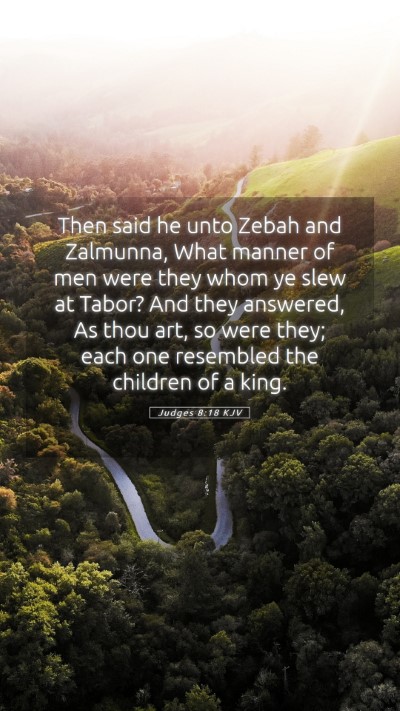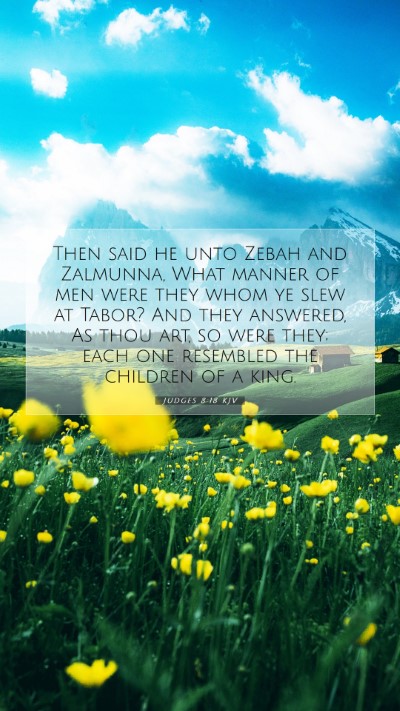Bible Verse Commentary: Judges 8:18
Verse: Judges 8:18 (KJV) - "Then said he unto Zebah and Zalmunna, What manner of men were they whom ye slew at Tabor? And they answered, As thou art, so were they; each one resembled the children of a king."
Introduction
This verse is situated in the narrative of Gideon's victory over the Midianites, specifically capturing his encounter with the Midianite kings Zebah and Zalmunna. Understanding this verse involves exploring its historical context, character motivations, and thematic significance.
Historical Context
Judges 8:18 is part of a larger account detailing the struggles of Israel under oppressive foreign rule. At this time, Gideon, also known as Jerubbaal, has just defeated an overwhelming Midianite army. Reflecting on the significance of the events and the characters involved provides valuable insights into the nature of leadership and the consequences of power struggles.
Bible Verse Interpretations
Matthew Henry notes that Gideon's inquiry about the slain men reveals his righteous indignation and the noble bearing of those who fell. He interprets the response of Zebah and Zalmunna as an acknowledgment of their valor, suggesting that the slain men resembled princes, highlighting their dignity and perhaps their noble lineage.
Albert Barnes emphasizes the traits of leadership that Gideon and these slain men exhibit. Their princely resemblance signifies not just their outward appearance but reflects their character—imbued with courage and a call to fight for their people. This interpretation sheds light on Gideon's own role in Israel's deliverance and the intrinsic qualities of true leadership.
Adam Clarke elaborates on the tragic state of warfare and how even noble figures can fall in battle. He suggests that Gideon is contrasting the fates of these men with Zebah and Zalmunna, emphasizing that even elevated characters face dire consequences in the turmoil of conflict, thereby questioning the morality of their actions in the fight against Israel.
Character Analysis
Gideon
Gideon stands as a central figure in the narrative, embodying the archetypal hero. His questions to Zebah and Zalmunna showcase his commitment to discerning the righteousness of their actions. He exemplifies a leader who does not merely seek vengeance but desires to understand the moral fabric of the battle.
Zebah and Zalmunna
These Midianite kings represent the forces opposing Israel, yet their response betrays a recognition of the valor within Israel's ranks. Their acknowledgment of the slain men’s princeliness indicates a respect for the nobility of those they fought against.
Thematic Significance
This verse explores themes of identity, leadership, and moral consequence. The description of the slain as resembling "the children of a king" signifies the potential for nobility in every person and raises questions about the righteousness of war.
Furthermore, it prompts readers to examine the qualities they associate with leadership and valor. In understanding this verse, one may reflect on the applications of these themes in contemporary contexts, especially regarding warfare and justice.
Application of Bible Verses to Daily Life
Judges 8:18 encourages individuals to ponder their character and the legacy they leave behind. In a world rife with conflict, the call to lead with integrity and to recognize nobility in others remains timeless.
- Courage: Embrace bravery in the face of challenges.
- Respect: Honor the valor of all individuals, regardless of their background.
- Moral Reflection: Evaluate the consequences of actions, especially in leadership roles.
Related Bible Cross References
- Judges 7:18 - Gideon's battle tactics.
- 1 Samuel 9:16 - God's choice of leaders.
- Ecclesiastes 3:8 - A time for warfare.
- Matthew 5:9 - Blessed are the peacemakers.
Conclusion
In summary, Judges 8:18 offers profound insights into the nature of leadership, the tragedy of battle, and the inherent dignity of individuals. Through combined wisdom from various public domain commentaries, this verse can lead to deeper Bible study insights, contributing to a more comprehensive Bible verse understanding.


